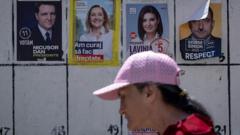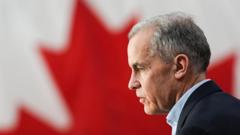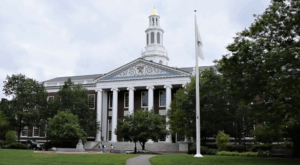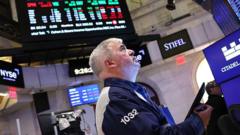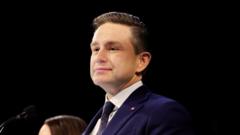The Liberal Party of Canada held its inaugural leadership debate in French, focusing heavily on the potential impacts of a second Trump presidency alongside pressing domestic issues like immigration and healthcare.
Trump's Impact Looms Over Canadian Liberal Leadership Debate
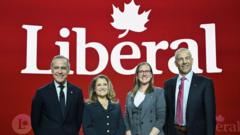
Trump's Impact Looms Over Canadian Liberal Leadership Debate
Candidates for the Liberal Party leadership grapple with how to address Trump's potential second term amid discussions on domestic challenges.
In a first-of-its-kind debate featuring candidates Mark Carney, Chrystia Freeland, Karina Gould, and Frank Baylis, the issue of how to respond to Donald Trump's continuous threats towards Canada took center stage. Freeland, the former Finance Minister, asserted that Trump represents "the greatest threat to Canada since World War Two," emphasizing the need for readiness against his ambitions to annex Canada as the "51st state." Drawing on her prior experience negotiating trade agreements, she underscored concerns regarding Trump's increasingly aggressive isolationist stance, reflecting widespread fears over economic and territorial implications.
Candidates proposed various strategies to bolster Canada’s position; Baylis suggested forming a "new economic bloc" with countries like the UK and Australia, while Carney emphasized advancing Canada’s clean energy capabilities and resource management to enhance economic resilience. He noted that tariffs might be unavoidable should Trump follow through on proposed actions against Canadian goods.
Amid discussions on international politics, candidates unanimously agreed on the necessity of sustained support for Ukraine. Freeland advocated for reallocating seized Russian assets to assist the wartime effort, while Carney highlighted the importance of including Ukrainian voices in any negotiations concerning their future.
As the debate progressed, candidates also turned their attention to domestic priorities, such as managing the federal budget deficit and addressing crime rates. Notably, both Carney and Freeland distanced themselves from Trudeau's carbon tax policy—an indication of how electoral pressures are reshaping party strategies.
The rhetoric around Conservative Party leader Pierre Poilievre emerged during discussions, with Liberal candidates arguing his leadership would be inadequate in countering Trump's potential actions. With Poilievre currently leading in national polls, contrasting positions within the Liberal Party may influence upcoming voter preferences.
The debate marks the first of two, with a second English-language event scheduled, leading up to the crucial vote on March 9 for a new leader, who will become the prime minister until the next general elections in October.
As candidates navigate both international tensions and domestic concerns, the debate highlights the complexities involved in Canadian politics as they prepare for a future potentially influenced by the unpredictable nature of Trump's leadership.
Candidates proposed various strategies to bolster Canada’s position; Baylis suggested forming a "new economic bloc" with countries like the UK and Australia, while Carney emphasized advancing Canada’s clean energy capabilities and resource management to enhance economic resilience. He noted that tariffs might be unavoidable should Trump follow through on proposed actions against Canadian goods.
Amid discussions on international politics, candidates unanimously agreed on the necessity of sustained support for Ukraine. Freeland advocated for reallocating seized Russian assets to assist the wartime effort, while Carney highlighted the importance of including Ukrainian voices in any negotiations concerning their future.
As the debate progressed, candidates also turned their attention to domestic priorities, such as managing the federal budget deficit and addressing crime rates. Notably, both Carney and Freeland distanced themselves from Trudeau's carbon tax policy—an indication of how electoral pressures are reshaping party strategies.
The rhetoric around Conservative Party leader Pierre Poilievre emerged during discussions, with Liberal candidates arguing his leadership would be inadequate in countering Trump's potential actions. With Poilievre currently leading in national polls, contrasting positions within the Liberal Party may influence upcoming voter preferences.
The debate marks the first of two, with a second English-language event scheduled, leading up to the crucial vote on March 9 for a new leader, who will become the prime minister until the next general elections in October.
As candidates navigate both international tensions and domestic concerns, the debate highlights the complexities involved in Canadian politics as they prepare for a future potentially influenced by the unpredictable nature of Trump's leadership.

